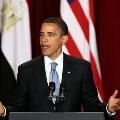Mixed Reviews in Europe, Middle East for Obama's First Year
U.S. President Barack Obama has drawn crowds wherever he goes. Visiting Europe earlier in the year, he was treated almost like a rock star.
For many, he was a symbol of hope and inspiration. British students, Nina and Simon at King's College in London were no exception. "I think he put it on the pedestal that people from anywhere could actually achieve a dream," Nina said. "His whole demeanor is actually quite impressive as well," Simon said. Promise of change brings benefits Mr. Obama's promise of change, of reaching out to the world resonated with a wider public and won him the Nobel Peace Prize - less than a year into his first term of office. Europeans liked the change in tone, but also wanted specifics, says Tomas Valasek, Director of Foreign Policy and Defense at the Centre for European Reform in London.
"We have a real stake in who runs the United States and Obama because he is so popular worldwide because he says he wants to try to bring in other actors- Chinas, Russias of this world - into the running of the global system - because of that he is fantastically popular," Valasek said. Many issues unresolved After nearly a year in power, the war in Iraq is winding down, but violence is still common and the country is far from stable. The United States is about to send more troops to Afghanistan and is asking NATO partners to do likewise. Iran and North Korea show no signs of giving up their nuclear ambitions. And, efforts to forge a global alliance against global warming fell far short at the December climate change summit in Copenhagen.
Too many issues unresolved have dimmed public enthusiasm for the American president, says Valasek.
"He has opened an awful lot of issues, an awful lot of problems, an awful lot of challenges, and he does not seem able to bring any of them to close," he said. Much the same sentiment can be heard in the Middle East. President Obama's June speech at Cairo University, reaching out to Muslims, was welcomed. Support for Israel problematic Professor Hassan Nafae of Cairo University says people were hoping for a change in U.S. policy.
"I was one of those who attended his wonderful speech," Nafae said. "But I am afraid to say that now the people started to lose a little bit the hope that he will be able to change things, especially vis-a-vis the Arab-Israeli conflict." The crux was always the Israeli-Palestinian conflict. Early on, Mr. Obama asked Israel to halt all West Bank Jewish settlement in order to bring Israelis and Palestinians back to negotiations. But, when Israeli Prime Minister Benjamin Netanyahu refused, the president backed down, accepting less than a total freeze.
For Palestinians, Radi and Jumana Jara'i in the West Bank city of Ramallah that only confirmed what they see as a U.S. bias toward Israel.
"A year ago, we were hopeful. Now we do not. Now we blame the United States by [for] supporting Israel without any limits, without any conditions," Radi said. "We would like to see a real fair stand from the United States to achieve peace, to achieve equality here in the region." "I admired him [Obama] as a man," added Jumana. "So I am disappointed now, but I can say only one thing - it is all the American policy that will never change." Unrealistic expectations?
There is concern that opportunities are slipping away. But maybe expectations were just too high, says Tomas Valasek.
"Of course, in some ways this was a mission impossible," Valasek said. "We expected too much of him. Even if he walked on water he still would not be able to deliver." There is still widespread appreciation for President Obama's emphasis on diplomacy, even though the initial support for him has waned. And with many challenges ahead in the coming year, no doubt all eyes will remain on Mr. Obama to see how he deals with them.

